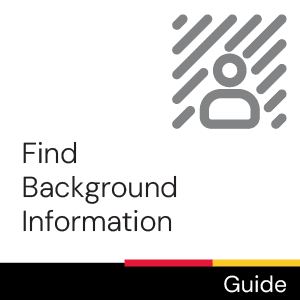Time commitment
Less than 2 minutes
Description
This video will identify the importance of doing background research in order to successfully find relevant primary sources.
Video
Transcript
Having a hard time finding primary sources on your topic?
Because primary sources can exist in almost any format and location, it's often difficult to know how and where to start searching.
Looking for primary sources is a lot easier if you do some background research on your topic first.
Do some preliminary background research by reading encyclopedia articles, journal articles, and books on your topic.
As you do this, write down the names of any relevant individuals and groups, places, and events.
Identifying these specific details can help you generate ideas for specific primary sources.
Let's say the focus of your paper is public attitudes towards immigrants in Britain from 1950 to 2001. The possibilities for primary sources on such a broad subject are endless.
Your preliminary research might help you to identify specific individuals like Lord Peter Carrington, a key figure in the anti-immigrant government in Britain in the early 1980s, and specific groups like the British Refugee Council, an organization that has provided direct support to refugees and asylum seekers.
Knowing about the involvement of these individuals and groups will help you identify primary sources to which they were connected.
Examples of primary sources you might look for include speeches by Lord Carrington or reports by the British Refugee Council.
You might also identify specific places like west London as a site of immigrant settlement in the 1950s.
[A map of London is shown]
This might lead you to concentrate your searching in newspapers local to the area.
[Images of the front pages of editions of the newspaper The Mirror and The Times are shown]
You might also come across references to specific events like the 1963 Bristol Bus Boycott.
[Image of participants in the Bristol Bus Boycott talking in front of a bus is shown]
This might lead you to look for mention of the boycott in local publications or to search for materials produced by the campaign itself.
[Image of top of news article on Bristol Bus Boycott and photograph of boycott protestors holding placards]
In sum, doing preliminary background research to identify individuals, groups, places, and events related to your topic will make it easier to identify relevant primary sources. If you need help getting started with this background research, or would like help searching for specific primary sources you’ve identified, get in touch!
[lib.uoguelph.ca]
[Twitter/Instagram: @uglibrary Facebook: /McLaughlinLibrary
[YouTube: /UoGLibrary]
[This work is licensed under a Creative Commons Attribution-NonCommercial-ShareAlike 4.0 International License.] For more information about our services, and what we're offering this semester, visit our website: www.lib.uoguelph.ca. To get up-to-date information about workshops and events, follow us on social.]
License

This work is licensed under a Creative Commons Attribution-NonCommercial-ShareAlike 4.0 International License.
Recommended
- Ask Chat is a collaborative service
- Ask Us Online Chat hours
- Contact Us
